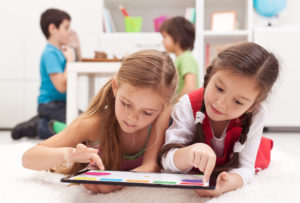With schools closing and events being postponed or cancelled due to Coronavirus, how can parents break the news to their kids?
The disappointment around missed opportunities and fun experiences is one of the more challenging things for parents to navigate with children during this time. It’s best to be calm and factual when breaking the news to kids that something will be postponed or canceled, and acknowledge how disappointing and frustrating that may feel to them. Parents can empathize and acknowledge how they are feeling about it as well, to let the kids know they are not alone in these feelings. They should provide all available information, and be truthful about what they don’t yet know as many things are changing quickly. In terms of how to explain school closing to kids due to Coronavirus, this might sound like a bit of a bait and switch to them. They might think “yay longer summer” but what this means for most kids is that they will need to complete their school-work at home and that they won’t get to see their friends for a while. This news may come harder to them.
How can parents respond to the emotions kids have surrounding this disappointment?
It’s essential for parents to acknowledge and empathize with whatever emotions kids may have around the situation. They may feel sad, disappointed, angry, frustrated, or a combination of many of these feelings. Parents should be sure to tell children that however they are feeling is okay and appropriate, and empathize by sharing that they are feeling some of those same things as well. It’s not helpful to immediately shift to trying to cheer them up, or telling them that they shouldn’t feel whatever uncomfortable emotion they are experiencing. Telling a child “don’t feel sad” or “cheer up it’s not that big a deal” dismisses their feelings and is unhelpful. Encourage kids to share how they are feeling, and let them know that their emotions are acceptable. What they do with those emotions may require some discussion, especially if they are being disrespectful or acting out in inappropriate ways. However, the emotions themselves are okay and should be supported.
Are there ways to divert attention? Or, how can parents best support their kiddos with something that’s so hard to understand?
Once you’ve given the child the news, acknowledged and accepted their feelings, and empathized with them it is then appropriate to move into a mode of what can be done to help the situation. Distraction with another activity or opportunity they can participate in may be appropriate. If an event has been postponed it may be helpful for younger kids to make a paper chain or chart they can use to track how many days until the event will take place. Older kids can be encouraged to write it on the calendar to look forward to it.
If something like vacation has been canceled it can be helpful to start looking together at other options for a trip later this year and include kids in looking at things online or researching possibilities. This helps shift them into a problem-solving mode as opposed to getting stuck in disappointment mode. Looking ahead to other things that they can look forward to is also helpful, even small things that you may be able to do from home during these days.
Ultimately, while handling disappointment with kids can be a challenge, it is also a necessary and important part of helping kids grow and develop resilience.
Children who experience and learn how to handle disappointments in life are much better able to handle the realities of life as they grow into adulthood. It’s important for parents to realize that we can’t shield our children from all of the disappointments and discomforts of life, nor should we be trying to do that.
Often dealing with child disappointment is harder for the adult than it is for the child, and we need to set aside our own uncomfortable emotions to support our child in being resilient in the face of things that feel difficult to manage. Doing this is one of the best gifts we can provide our children, even though it may not feel that way at the time. Allowing children to feel uncomfortable emotions, empathizing with them, and supporting them to move through those is the key to helping them be emotionally healthy and resilient as adults.
There have been and will continue to be many disappointments for kids and families now and in the coming weeks. Parents can use these ideas to respond in a way that supports growth for their kids, which ultimately is a silver lining in a challenging situation like what we are living through right now. I hope this has given you some tools on how to explain school closing to kids due to coronavirus.
A few more helpful resources
While canceled school and canceled events are going to be tough to deal with, I offer you the possibility of thinking about this time as advantageous for your children. Especially if they are dealing with any kind of behavior issues or have special needs. In this blog post, I talk about how this experience of slowing down the pace of life might really help kids “What If This Pandemic Is The Best Thing To Happen To Children With Challenges?” If you are looking for ideas on what to do with your kids to keep them engaged in physical, academic learning, mindfulness, and family activities I’m posting several ideas daily on my Instagram account.
What You Should Do Next:
- Sign up for my Better Behavior Naturally community newsletter
Sign up for my newsletter to get tips, resources, and supports to improve your child’s attention, anxiety, mood, and behavior…while making your job as a parent easier. Plus, when you subscribe I’ll also send you a copy of my strategy-packed guide 5 Keys to Better Behavior Naturally!
- Sign-up for my FREE Do Something Daily Better Behavior Challenge
Register for my 7-day challenge to get 7 days of quick, simple steps that improve behavior naturally…in just minutes a day. Tackle one tiny task each day to support your child, and join the thousands of parents who have watched their child and family change for the better.
- Enroll in one of my workshops
Check out one of my many workshops where you’ll join my exclusive community of parents in a one-of-a-kind virtual resource accessible 24/7. Whether you’ve got a child with a diagnosis like autism or ADHD, or are becoming more and more frustrated with a child who struggles to listen and cope, these workshops are designed to give you the information, tools, and support you need…whenever you need it.








